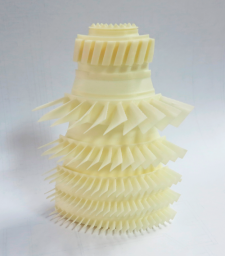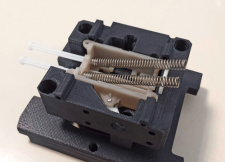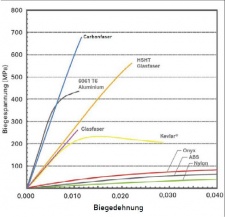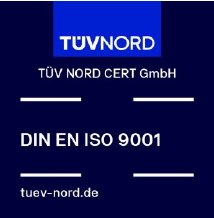3D printing
Production of thermoplastic components as functional models, prototypes and small batches
As an important element of the development of new products, the FDM construction process can be used to create small visual samples, e.g. for presentations, as well as to realise functional prototypes or components in large quantities.br />This allows ideas to take shape without high production and material costs.
The FDM construction process is a very interesting alternative to conventional production methods, especially for companies that need to have development results at their disposal quickly.
The FDM construction process even allows the realisation of components with complex geometries. Hollow bodies or assemblies with moving parts are "cast in one mould".
The FDM construction process is predestined for
- first tests of ideas and concepts
- creation of models and functional prototypes
- production of real components

1/4 einer Turbinenstufe

Aufnahme für Funktionstest
Material descriptions - Composite materials
Determine the material and stability of your components and we will produce perfect functional parts within a few hours.
These materials can be processed:
- Onyx (plastic)
Thermoplastics for demanding technical purposes With Onyx, strong and exact parts can be produced. Onyx is already 1.4 times stronger and stiffer than ABS and can be reinforced with any type of endless fibre. Onyx sets new standards for surface quality, chemical resistance and heat resistance.
Bending strength 81 MPa
Bending stiffness 2.9 GPa - Nylon (plastic)
Resistant, flexible thermoplastic Nylon parts are flexible, impact resistant and can be reinforced with any Markforged continuous fibre. The material is best suited for applications that require more flexibility or low friction.
Bending strength 32 MPa
Bending stiffness 0.84 GPa - Glass fibre (fibre)
Increased fibre force We recommend glass fibres as a first step with endless fibres. They offer high strength at an affordable price. Glass fibres have two and a half times the strength and eight times the stiffness of onyx and enable the manufacture of robust tools.
Bending strength 210 MPa
Bending stiffness 22 GPa - Kevlar® (fibre)
Increased fibre force We recommend glass fibres as a first step with endless fibres. They offer high strength at an affordable price. Glass fibres have two and a half times the strength and eight times the stiffness of onyx and enable the manufacture of robust tools.
Bending strength 210 MPa
Bending stiffness 22 GPa - Carbon fibre (fibre)
As strong as aluminium, at half the weight Carbon fibres have the highest strength-to-weight ratio among our reinforcement fibres. Compared to onyx, reinforcement with carbon fibres can achieve six times the strength and eighteen times the stiffness. This type of fibre reinforcement is often used for parts that replace machined aluminium parts.
Bending strength 470 MPa
Bending stiffness 51 GPa - HSHT Glasfaser (Faser)
Strength at high temperatures HSHT (High Strength High Temperature) glass fibres offer the strength of aluminium and high heat tolerance. They have five times the strength and seven times the stiffness of onyx and are preferred for parts exposed to high operating temperatures.
Bending strength 420 MPa
Bending stiffness 21 GPa
Quelle: ©2018 Markforged, Inc.
 Copyright ©2018 Markforged, Inc.
Copyright ©2018 Markforged, Inc.
Materialverhalten
 Call
Call Route
Route Mail
Mail